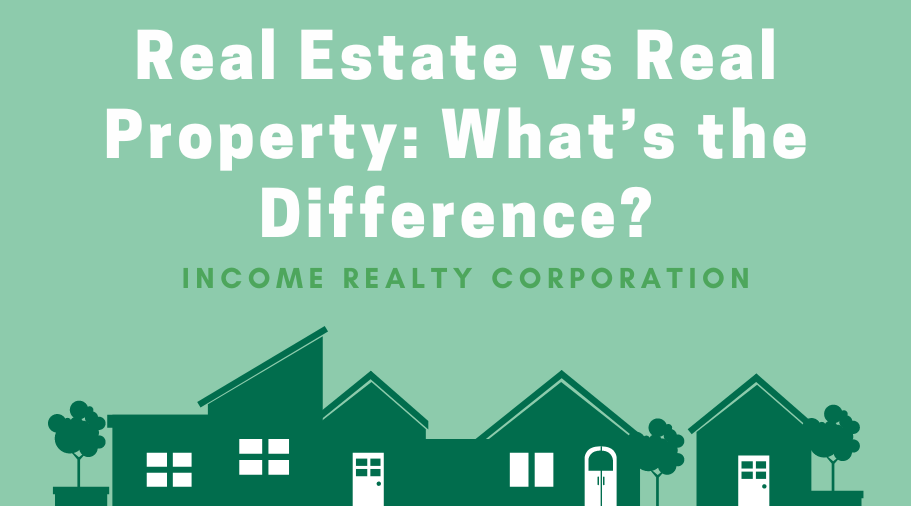For landlords and property investors, understanding the difference between real estate and real property is paramount. While the terms are often used interchangeably, they carry distinct legal and practical implications that can significantly impact investment strategies, taxation, and asset management.
In this guide, we will guide you through the differences between real estate and real property, helping you navigate the real estate market.
What is Real Estate?
Real estate encompasses physical land, including any structures or improvements attached to it. This broad term encompasses residential, commercial, and industrial properties, as well as vacant land and undeveloped parcels.
Types of real estate:
1. Residential Real Estate
- Single-Family Homes: Standalone houses designed for occupancy by a single family unit.
- Multi-Family Homes: Properties containing multiple housing units offering accommodation for multiple families within the same structure.
- Condominiums (Condos): Individual units within a larger complex or building, owned by individual residents who share ownership of common areas and amenities.
- Townhouses: Attached or semi-detached homes with multiple floors, sharing walls with neighboring units but offering independent ownership of the dwelling.
2. Commercial Real Estate
- Office Buildings: Properties designed and utilized primarily for office space, ranging from small office complexes to high-rise towers catering to corporate tenants.
- Retail Properties: Commercial spaces intended for retail businesses, including shopping malls, strip malls, standalone storefronts, and mixed-use developments.

- Industrial Properties: Facilities designed for manufacturing, warehousing, distribution, and other industrial activities, such as factories, warehouses, distribution centers, and industrial parks.
- Hotels and Hospitality: Properties providing accommodation, dining, and recreational amenities for travelers and guests, including hotels, motels, resorts, and bed-and-breakfast establishments.
3. Land and Development Properties
- Vacant Land: Undeveloped parcels of land without any structures or improvements, offering opportunities for development, agriculture, conservation, or recreational use.
- Residential Development: Land earmarked for residential construction, including single-family subdivisions, condominium projects, and planned communities.
- Commercial Development: Land designated for commercial use, such as office parks, retail centers, and mixed-use developments combining residential and commercial components.
- Industrial Development: Land zoned for industrial purposes, suitable for the construction of manufacturing facilities, warehouses, logistics hubs, and industrial parks.
4. Specialized Real Estate
- Healthcare Real Estate
- Educational Real Estate
- Special Purpose Properties
- Mixed-Use Developments
5. Real Estate Investment Vehicles
- Real Estate Investment Trusts (REITs): Investment vehicles that allow individuals to invest in portfolios of income-generating real estate assets, providing diversification, liquidity, and passive income.
- Real Estate Partnerships: Collaborative ventures where multiple investors pool their resources to acquire, develop, or manage real estate properties, sharing the risks and rewards of the investment.
- Real Estate Syndications: Investment structures involving a sponsor or syndicator who raises capital from individual investors to finance real estate projects, offering potential returns through rental income, capital appreciation, or profit-sharing arrangements.
.jpg)
Real Property
Real property, on the other hand, extends beyond the tangible assets themselves to include the legal rights associated with land and its improvements. Real property comprises the bundle of rights vested in the ownership of real estate.
These rights are often delineated in legal documents like deeds, leases, and easements, shaping how owners can utilize and benefit from their real estate holdings.
Distinguishing Characteristics
Tangibility
As tangible assets, real estate properties have a physical presence and are subject to spatial limitations. Whether it’s a residential condominium or a vast expanse of farmland, real estate assets occupy physical space and can be touched, seen, and developed.
While real property encompasses tangible assets, its essence lies in intangible rights rather than physical attributes. These rights, such as ownership, possession, and usage, are legally recognized and can be bought, sold, or transferred independently of the underlying real estate.
Legal Framework
Real estate transactions are governed by a complex web of laws and regulations that vary by jurisdiction. From zoning ordinances to property taxes, you must navigate a myriad of legal considerations when acquiring, owning, or disposing of real estate assets.
As a landlord, you must be cognizant of these legal frameworks to protect your interests and ensure compliance with relevant laws governing property ownership and management.
Investment Implications
Investing in real estate offers landlords the opportunity to generate rental income, build equity, and diversify their investment portfolios.

Real property investments extend beyond mere ownership of physical assets to encompass the rights and interests associated with land. You can leverage these rights to maximize the value of your properties through strategies such as leasing, easements, or mineral rights agreements.
Practical Considerations for Landlords
Asset Protection
Understanding the legal issues of real property rights can help landlords safeguard their assets against potential liabilities.
By structuring ownership entities and drafting comprehensive lease agreements, you can shield your real property holdings from lawsuits, creditor claims, and other financial risks.
Taxation
The tax treatment of real estate and real property can vary significantly, depending on factors such as location, usage, and ownership structure. You should consult with tax professionals to optimize your tax planning strategies and capitalize on available deductions, credits, and incentives related to property ownership.
Estate Planning
Estate planning is essential for landlords seeking to preserve their real property holdings and transfer wealth to future generations. By crafting succession plans, wills, and trusts, you can ensure seamless transition of real property assets while minimizing estate taxes and probate costs.
Due Diligence
Before acquiring or disposing of real estate assets, landlords must conduct thorough due diligence to assess the legal, financial, and environmental risks associated with the properties. From title searches to property inspections, diligent scrutiny can help you make informed decisions and avoid potential pitfalls.
Conclusion
While real estate and real property are often used interchangeably, they represent distinct legal and practical concepts with significant implications for landlords and property investors.
By understanding the differences between these terms and their respective characteristics, landlords can navigate the complexities of property ownership, mitigate risks, and capitalize on opportunities in the dynamic real estate market.
If you’re looking to hire a professional property management company to manage your rental property? Contact Income Realty Corporation today!






